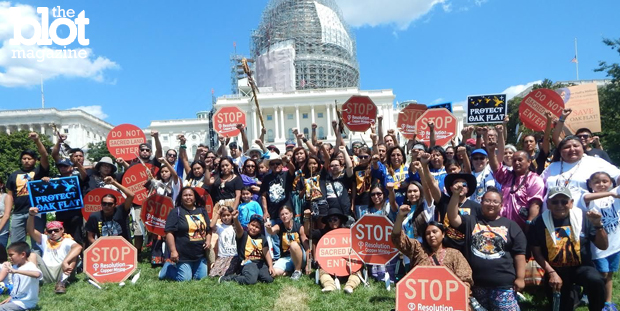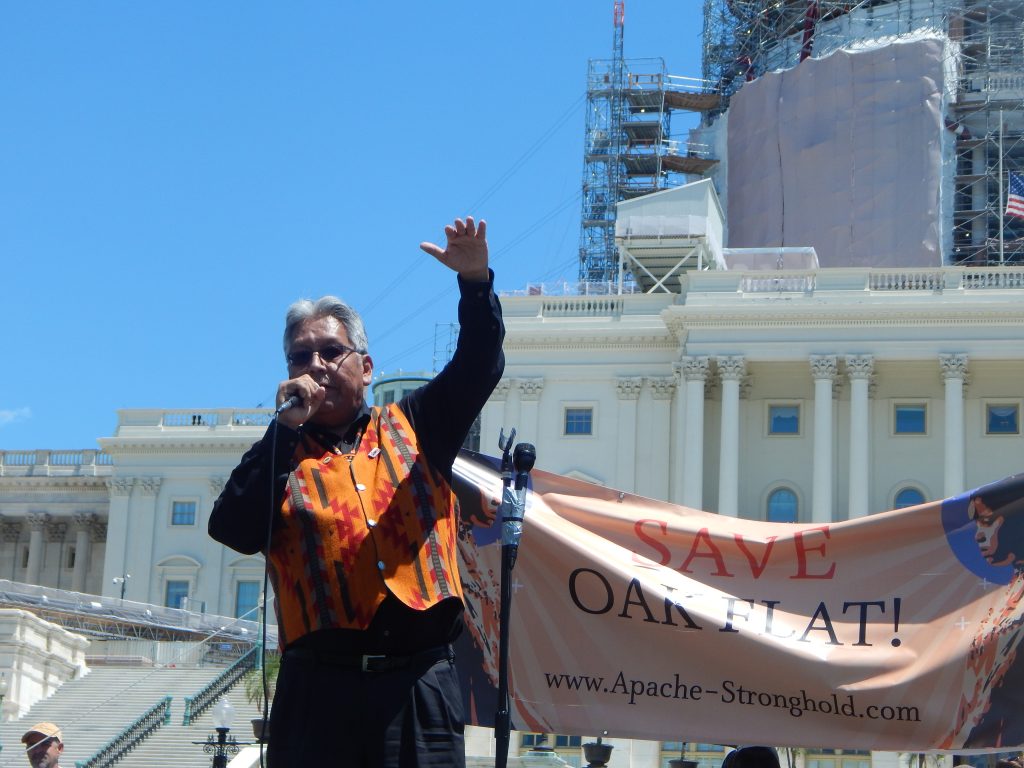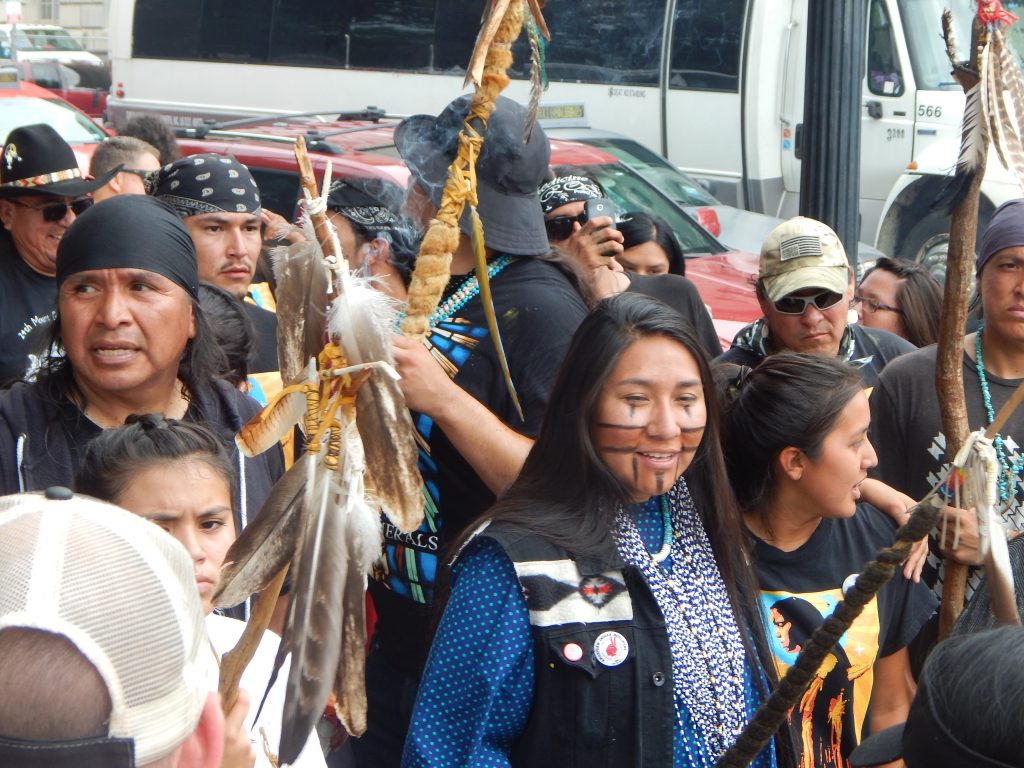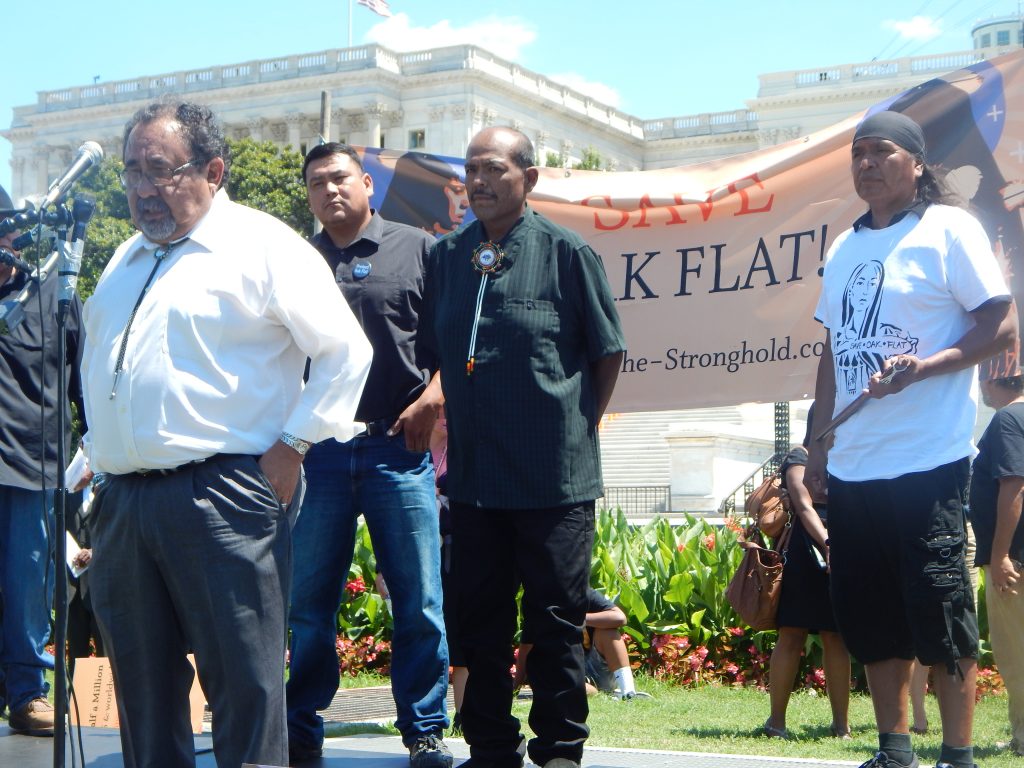Because their indomitable spirit as a people is ingrained in them through generations, the San Carlos Apache will not relent to a crooked giveaway of their sacred lands.
The Apache may not live big cities like New York or Washington, D.C., but after members arrived in the nation’s capital alongside other Native American tribes and religious groups who were picked up with the caravan on the way from Arizona, they stood up for their beliefs and made themselves heard during a rally in front of the locus of American power.
The Apache’s history and existence as a people is held within the Oak Flat area of Tonto National Forest in southeastern Arizona, and if it is destroyed by Rio Tinto — a mining company that wants to extract a copper deposit underneath — much of that legacy will be lost forever.
Read more: Stepping on Sacred Ground: Defense Bill Includes Native American Land Grab
To get at the copper — which will mostly be exported for profit by the Australian-English mining conglomerate with very limited benefit to the state, nearby towns or area tribes — a two-mile crater will have to be dug. Tribal leaders know that once the process is begun there will be no undoing the damage to the land. Oak Flat will then be forever scarred, and the U.S. government will have completed yet another chapter of a long, sad history in the subjugation of native peoples.
The two-mile crater will “completely destroy everything on the surface,” San Carlos Apache Vice Chairman Tao Etpison told TheBlot Magazine. Etpison and other members of the tribe are working tirelessly to ensure that will not happen, but it’s an uphill battle to get out of a hole in the ground that hasn’t even been dug yet.
APACHE’S “LAST BATTLE”
This crooked land swap was made through the Southeast Arizona Land Exchange and Conservation Act as part of the 2015 National Defense Authorization Act (NDAA). Both Arizona Sens. John McCain and Jeff Flake supported closed-committee additions to the must-pass legislation.
The Oak Flat land is a holy prayer site. It is where young girls become women during coming-of-age ceremonies. The land is also near the site of the “Apache Leap,” where tribal members solemnly chose death rather than submit to the encroaching U.S. Army, which would forever alter a culture that had remained intact for centuries. So much of Native American history in this country is lost and gone forever. Should Oak Flat be mined, the San Carlos Apache could suffer the same fate.
“We will no longer be who we are,” former San Carlos Apache Chairman Wendsler Nosie Sr. said. “That will probably be our last battle.”
With few allies in government who do more than give lip service to Native American issues, Rep. Raul Grijalva (D-Az.) has answered the call to ring the alarm on this horrendous hijack. He has written legislation to eliminate provisions in the NDAA that allows the land to be mined. Grijalva believes that destruction of Oak Flat — which was twice excluded from consideration of mining interests by presidents Dwight Eisenhower and Richard Nixon under the status as a sacred native site — would begin a runaway process.
“Two presidents affirmed that it is set aside in perpetuity,” Grijalva told TheBlot. “[The bill] takes the Oak Flat out of the trade. We feel it is the only opportunity left to us.”
He is currently lobbying fellow members of Congress to build a critical mass of 100-125 co-sponsors. The goal is to bring the bill to the floor of the House for a hearing and hopefully a full vote.
“It’s an important precedent for Indian country,” Grijalva added. “We’ve been fighting this for eight years.”
LOST IDENTITY — AGAIN
If Oak Flat is destroyed, “the identity is gone,” Nosie said. “In every nationality, there is the foundation of where they came from. We still go to these places to teach our children.“
Though the Apache Stronghold movement faces daunting odds, it is building a momentum in opposition. Rallies in several cities have brought the issue to the attention of government and the news media, and it is gaining traction online through the #SaveOakFlat hashtag.
The nation’s newspaper of record, The New York Times, has taken note, and in May printed an op-ed piece on the deal. It read in part, ”Congress has handed over a sacred Native American site to a foreign-owned company for what may be the first time in our nation’s history.”
The deal was pushed through Congress partly with promises of jobs at the mine, though Rio Tinto will not guarantee any long-term positions will be reserved for Apache members or those living on the San Carlos reservation.
“The wrong message is there’s going to be a lot of jobs there,” Etpison said. “The copper will be mined by robotics” and work will be done by high-tech machinery in other states. “Construction will require manpower, but that’s not going to last very long.”
Read more: Apache Rally Raises Awareness of Arizona Land Grab
Etpison, who was interviewed about the situation at Oak Flat for a segment on “The Daily Show,” also spoke to the far-reaching consequences of a shady deal like this one being completed for the entire country.
“I think it’s no longer an Arizona issue,” he said. “It’s no longer a tribal issue. It’s becoming an American issue.”
Nosie said other protests, rallies and events to oppose the destruction of the land are planned. Reflecting on the rally at the Capitol, he hopes that traveling to Washington, D.C., would “shine a light on all the darkness there.”
The San Carlos Apache also plan to petition the National Congress of American Indians to hold a special meeting with tribal leaders. They will invite members of Congress and their staffs to join as well. “We’re going to show the truth,” Nosie said. “It will really show the lies of McCain.”
And though McCain and Flake have erred, Nosie hopes the men will eventually be able to realize their mistakes. “The people there are human beings, but for some reason when they get to Washington, D.C., they forget the people,” he said.
Noah Zuss is a reporter for TheBlot Magazine.









